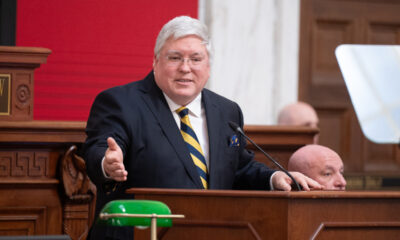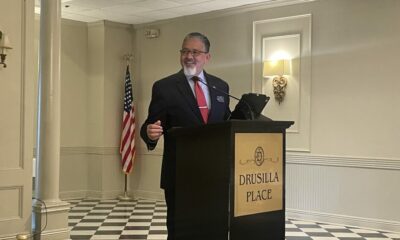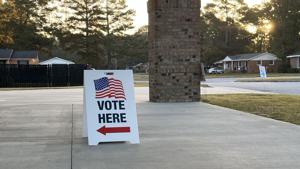virginiamercury.com – Markus Schmidt – 2025-03-19 15:43:00
Youngkin defends federal job cuts, says Virginia’s economy is strong
by Markus Schmidt, Virginia Mercury
March 19, 2025
Gov. Glenn Youngkin on Wednesday doubled down on the necessity of sweeping federal layoffs while attempting to reassure Virginians that the state’s economy is resilient. Speaking before administration officials and reporters in Richmond, Youngkin acknowledged the “real dislocation” caused by job losses but insisted that trimming the federal workforce was a necessary step toward fiscal responsibility.
“Today, we know we have a federal government that is facing huge fiscal issues with $37 trillion in debt, with $2 trillion being added every year. What that requires is real action quickly,” Youngkin said.
“Striving to gain efficiencies and reduce costs in the federal government is at the heart of regaining our fiscal responsibility as a nation, and I recognize that what comes with that is dislocation.”
The governor’s remarks came as he signed 180 of the more than 900 bills passed during the 2025 legislative session, with Monday’s deadline to take action on all legislation rapidly approaching.
Flanked by Lt. Gov. Winsome Earle-Sears and Labor Secretary Bryan Slater, Youngkin framed Virginia as a state of economic strength, touting the availability of more than 250,000 job opportunities through the Virginia Has Jobs platform.
“If you experience job dislocation, we want to help you along the path to a new career,” he said. “On top of that, there are 250,000 jobs that are available through this website that connects you with opportunities all over the state.”
Youngkin insisted that Virginia’s economy is thriving, citing statistics showing a low 3% unemployment rate and an increase of 276,000 jobs since he took office in January 2022. He argued that his administration has created an economic environment conducive to job growth and investment.
“Virginia is not just competing to win, but Virginia is winning,” Youngkin declared. “Since we started this effort together, we have seen 276,000 more people working today than in January 2022.”
The Democratic Party of Virginia (DPVA) wasted no time in criticizing Youngkin’s comments, arguing that his approach lacks real solutions for the thousands of Virginians facing unemployment.
DPVA Chairwoman Susan Swecker directly blamed Youngkin’s alignment with President Donald Trump’s economic policies for deepening uncertainty in the commonwealth.
“Virginia is not winning — Virginia is losing because of Glenn Youngkin’s weak and ineffective leadership and refusal to stand up to Donald Trump,” Swecker said in a statement.
“Over 300,000 Virginians are at risk of losing their jobs, and his only answer is for them to update their resumes and look for jobs online. It is embarrassing and quite frankly irresponsible for a governor to offer such out-of-touch and arrogant nonsense to hardworking Virginians facing an economic crisis.”
Earle-Sears, the current frontrunner in a three-way contest for the Republican gubernatorial nomination, echoed Youngkin’s optimism, emphasizing the need for continued investment in infrastructure and regulatory reforms to keep the state competitive.
“We win because we must invest in infrastructure, business-ready sites, especially for large employers, power generation and distribution, roads, and our spaceports,” Earle-Sears said.
“We must cut regulations and reduce the cost of doing business. We must build on the $1.2 billion of job savings from the streamlining of regulations against businesses.”
She also pointed to Virginia’s top ranking as CNBC’s “Top State for Business” in 2024 as a sign that the state’s economic policies are yielding results.
Among the legislation directly related to Virginia’s economy that Youngkin signed Wednesday is Senate Bill 1208, sponsored by Sen. Louise Lucas, D-Portsmouth, that will create a new $60 million grant fund aimed at driving investment and job creation in the semiconductor industry.
The proposal, identical to House Bill 2358 by Del. Luke Torian, D-Prince William, replaces the state’s existing semiconductor grant program and will benefit Micron Technology’s expansion in Manassas.
The governor framed the legislation as a critical step in securing the company’s continued growth in the commonwealth.
“This bill unlocks an opportunity for Micron to build new manufacturing capabilities in Virginia — $2.1 billion of investment, and they’ll hire 340 more people into the Micron family,” Youngkin said.
The measure also allows up to $10 million in bonus grants for additional job creation, reinforcing Virginia’s push to become a semiconductor manufacturing hub.
Youngkin said he would also sign SB 1207, which will establish the Lithium-Ion Battery Separator Manufacturing Grant Fund, allocating up to $60.6 million over 20 years to support a qualified company investing in battery separator production.
The company must commit to at least $1.35 billion in capital investment and create 2,015 full-time jobs in Pittsylvania County between July 1, 2024, and July 1, 2045 to receive funding.
The bill, which is identical to HB 2540, is part of Virginia’s broader push to position itself as a leader in battery technology and advanced manufacturing. Battery separators are a critical component in lithium-ion cells, used in everything from electric vehicles to energy storage systems.
Youngkin will further sign SB 1275, which allows the Virginia Economic Development Partnership Authority to designate sites as small as 25 contiguous acres — down from the previous 100-acre standard — as eligible for site development grants if they are located in a locality with 35 square miles or less of land area.
Youngkin praised the measure for making Virginia more competitive for business expansion, particularly in areas where large tracts of land are scarce.
“This bill expands our site readiness investment to counties and localities that are smaller, because not everybody has 100 acres available per a company, but they may have 25, and we have so many companies that want to come to Virginia,” Youngkin said.
And SB 1338, which also got Youngkin’s approval, will classify fusion energy as carbon-free and clean energy, making it eligible for inclusion in future energy policies and incentives.
The bill, which mirrors HB 1779, updates the state’s energy framework to align with advancements in nuclear fusion technology — a process that generates electricity by fusing atomic nuclei, producing minimal waste and no direct carbon emissions.
Youngkin told reporters that he will be rolling out his decisions on legislation in a piecemeal fashion over the next five days, with the majority coming on Monday.
“There will be a lot of bills that I’ll sign, there are a lot of familiar bills that I’ll be vetoing, and there are a lot of bills that I’m trying to make better,” he said.
Youngkin emphasized that his approach is centered on what is beneficial for Virginia’s business climate, making it clear that he will not approve measures he believes could harm economic growth.
“My filter here is really focused on bills that are good for Virginia business, and to make sure that we’re not entering or signing bills that are bad for business in Virginia,” he said, adding, “And this is really clear.”
YOU MAKE OUR WORK POSSIBLE.
SUPPORT
Virginia Mercury is part of States Newsroom, a nonprofit news network supported by grants and a coalition of donors as a 501c(3) public charity. Virginia Mercury maintains editorial independence. Contact Editor Samantha Willis for questions: info@virginiamercury.com.
The post Youngkin defends federal job cuts, says Virginia’s economy is strong appeared first on virginiamercury.com



















































